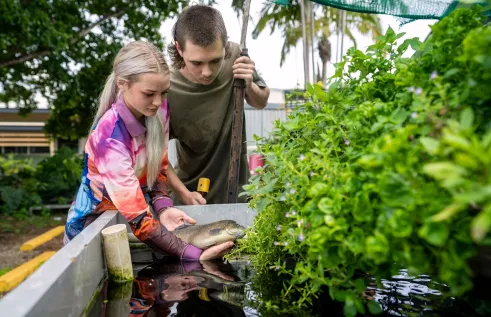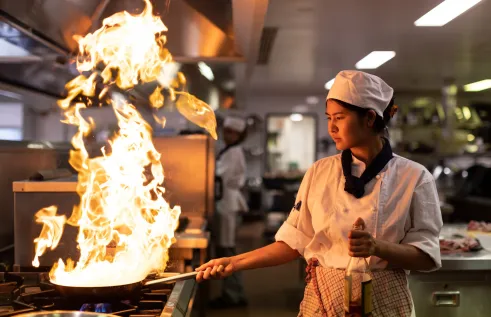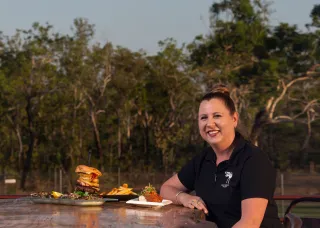Update your personalisation settings to view information about this course.
This course is only available to Domestic students and your preference is currently set to International.
This course is only available to International students and your preference is currently set to Domestic.
Key details
Duration
This program is delivered over a period of 1 - 2.5 years. The length of time to complete this qualification will depend on the location, study mode and/or units selected and will vary depending upon how long a student takes to reach the required competency level.
Intake
Locations
Entry requirements
View full entry requirementsCourse code
Overview
Availability: Applications are open for 2026.
Online Application: This course is available for online application.
Apprenticeships/Traineeships: This course can be undertaken as an apprenticeship. Visit TAFE Apprenticeships and Traineeships for more information.
Add Course/Program/Qualification description here
| Delivery Details | |
| Location | Alice Springs Palmerston |
| Duration | 1 year full-time 2.5 years part-time *Duration may vary depending on how long a student takes to reach the required competency level |
| Study Mode | Face-to-face *Information relating to study modes can be found in the 2026 TAFE Student Guide |
| Start Date | February 2, 2026 *Apprentices will receive an individual call-up notification letter. *A course timetable/study plan will be provided on application for the course. |
| Attendance | Block delivery Monday - Friday 8:00am - 4:00pm *Timetable supplied at interview |
Career opportunities
Possible occupations relevant to this qualification include:
- Cook
Credit transfers and advanced standing
Skill recognition
Recognition of Prior Learning (RPL)
RPL is the acknowledgement of a person's skills and knowledge acquired through previous training, work or life experience, which may be used to grant status or credit in a subject regardless of how and where they were attained, including overseas.This can include skills from:
- Previous study excluding courses at another VET/TAFE institution, but including courses at school or college, through adult education classes or training programs at work;
- Work experience (including both work that is paid and unpaid); and/or
- Life experience (for example leisure pursuits or voluntary work).
RPL is a form of assessment. It is used to determine whether a person has acquired, through formal or informal learning, the skills and experience consistent with the stated competency standards that comprise a qualification. RPL is not time referenced, so there are no parameters on how or when the skills are acquired. However, the skills that have been acquired through life experience etc., must be current and must match the elements and performance criteria contained in the individual unit.
Students seeking RPL need to indicate this on their enrolment form at the time of enrolment.
For further information please refer to the Applicant's Guide to the Recognition of Prior Learning or contact Student Central on 1800 061 963 (free call) or email Student.Central@cdu.edu.au.
Credit Transfer
Charles Darwin University as a Registered Training Organisation recognises the Australian Qualifications Framework qualifications and Statement of Attainments issued by any other Australian Registered Training Organisation.
Students are encouraged to submit any requests for credit from previous studies at the time of enrolment, to ensure they are not enrolling in units they may not need to undertake.
In order to apply for exemption/credit transfer from units completed at another training organisation, you will need to complete an Application for Exemption Form available from any campus, centre, or team, or a copy of the form can be obtained from the web.
Your completed Application for Exemption form together with attached documentary evidence (certified copy of Qualification/Statement of Attainment) to support your request for exemption/credit transfer should be submitted directly to the University either in person or by mail. Requests without documentary evidence will not be processed and will be returned to students. There are no fees attached to Credit Transfers.
Pathways
VET to Higher Education Pathway Mapping for completed Awards in the same field or discipline.
Further training pathways from this qualification include but not limited to SIT40521 Certificate IV in Kitchen Management, or other relevant Certificate IV and higher qualifications from the SIT training package.
Fees
2026 Fees
| Fee Type | 2026 Course Fees |
| Fee Free TAFE* | Free |
| Full Fee | $16,722.80 |
*This course is part of the Fee Free TAFE initiative. Fee Free TAFE and vocational education and training is a joint initiative of the Northern Territory Government and Australian Governments providing tuition-free training places to students wanting to train, retain or upskill.
Fee free places are available for eligible domestic students who are NT residents, limited places are available, so secure your place now.
Fees shown are indicative and subject to change annually. Actual course fees may vary depending on the units chosen. International non-student visa-holders; study eligibility needs to be verified before enrolment. Fees may vary depending on the visa type.
For further clarification and information on fees, payment options, instalment plans, and refunds, contact CDU on 1800 061 963 or refer to TAFE Fees and Payments.
International VET Package
Course information flyer(s)

Why study at CDU?
Study with the Territory's largest training provider and gain industry-ready skills and experience. Whether you're a high school student or a working professional, we've got the courses and qualifications you want plus the support and flexibility you need to succeed.
- Learn from expert lecturers and industry professionals
- Access to first-class facilities
- Recognition of prior learning to qualify faster

Why study at CDU?
Study with the Northern Territory's largest training provider and gain industry-ready skills and experience.
- Access to first-class facilities
- Recognition of prior learning accepted
- Packages into higher education available for most courses

Why study at CDU?
Study with the Territory's largest training provider and gain industry-ready skills and experience. Whether you're a high school student or a working professional, we've got the courses and qualifications you want plus the support and flexibility you need to succeed.
- Learn from expert lecturers and industry professionals
- Access to first-class facilities
- Recognition of prior learning to qualify faster

Why study at CDU?
Study with the Northern Territory's largest training provider and gain industry-ready skills and experience.
- Access to first-class facilities
- Recognition of prior learning accepted
- Packages into higher education available for most courses
What will I study?
To achieve SIT30821 Certificate III in Commercial Cookery, a total of twenty-five (25) units of competency must be completed comprising twenty (20) core and five (5) elective units as detailed in the packaging rules and listed below.
Course structure
20 core units, plus
5 elective units, consisting of:
- 3 units from Group A or Group B below
- 2 units from Group A, Group B or Group C below
The total nominal hours for the sequence listed below is 970.
| Code | Module/Unit of Competency | Hours |
| Core units of competency | ||
| SITHCCC023* | Use food preparation equipment | 25 |
| SITHCCC027* | Prepare dishes using basic methods of cookery | 45 |
| SITHCCC028* | Prepare appetisers and salads | 25 |
| SITHCCC029* | Prepare stocks, sauces and soups | 35 |
| SITHCCC030*# | Prepare vegetable, fruit, eggs and farinaceous dishes | 50 |
| SITHCCC031*# | Prepare vegetarian and vegan dishes | 40 |
| SITHCCC035*# | Prepare poultry dishes | 35 |
| SITHCCC036*# | Prepare meat dishes | 55 |
| SITHCCC037*# | Prepare seafood dishes | 35 |
| SITHCCC041* | Produce cakes, pastries and breads | 55 |
| SITHCCC042*# | Prepare food to meet special dietary requirements | 75 |
| SITHCCC043*# | Work effectively as a cook | 100 |
| SITHKOP009* | Clean kitchen premises and equipment | 13 |
| SITHKOP010 | Plan and cost recipes | 40 |
| SITHPAT016* | Produce desserts | 100 |
| SITXFSA005 | Use hygienic practices for food safety | 15 |
| SITXFSA006 | Participate in safe food handling practices | 40 |
| SITXHRM007 | Coach others in job skills | 20 |
| SITXINV006* | Receive, store and maintain stock | 20 |
| SITXWHS005 | Participate in safe work practices | 12 |
| Total nominal hours for core units | 835 | |
| Elective units of competency (Select 5 only) | ||
| BSBSUS211 | Participate in sustainable work practices | 20 |
| SITHCCC025* | Prepare and present sandwiches | 10 |
| SITHCCC038*# | Produce and serve food for buffets | 25 |
| SITHCCC040* | Prepare and serve cheese | 20 |
| SITHCCC044*# | Prepare specialised food items | 60 |
| Total nominal hours for elective units | 135 | |
| Total nominal hours for the qualification | 970 | |
Prerequisite units:
*SITXFSA005 Use hygienic practices for food safety
*SITHCCC027 Prepare dishes using basic methods of cookery
Entry requirements
Admission criteria
A Language, Literacy, Numeracy and Digital Literacy (LLND) evaluation helps identify any areas where you may need additional support to help you achieve your goals.
Applicants are required to attend a formal interview with the course coordinator to determine suitability for the course and ensure they have a clear understanding of the course requirements. At this interview stage students may negotiate any alternative training modes with the CDU Course Coordinator depending on their individual needs and availability.
While there is no qualification entry requirement, students will be expected to have employment in a relevant position in a commercial kitchen to satisfy the requirements of core unit SITHCCC043 Work effectively as a cook which requires students to complete 48 restaurant services.
Required Resources
Students are issued with the required learning and assessment materials for each unit.
Uniforms
A complete, clean laundered and ironed uniform and correct footwear must be worn at all times while attending class.
Uniform requirements for practical classes:
- 2 x White double breasted Chefs jacket (Not black. Complete with white buttons)
- 2 x Chef's trousers (Not black. Checked - modern or traditional)
- 2 x White apron
- 2 x Navy Blue neckerchief
- 1 x White Chef's Hat (skull cap)
- 1 x Shoes heavy duty, non-slip and clean (no sneakers or runners)
At your interview, the course facilitator, the course facilitator will give you more details suggesting where to purchase uniforms and tools of the trade, industry suppliers and price guidelines you should expect to pay.
Tools of Trade
Students will be required to supply their own tools of trade which includes cook's knives to use. All tools, uniforms and other equipment must be clearly identified by engraving or pen.
Starter toolkit:
- 1 x 25cm/30cm Chef's knife
- 1 x Steel
- 1 x Paring knife
- 1 x Vegetable peeler
- 1 x Thermometer
- 1 x Palette knife
- 1 x Boning knife
- 1 x Fish filleting knife
- 1 x Utility fork
- 1 x Thermal piping bag
- 1 x Set nozzles
- 1 x Sharpening stone
Tools must be kept clean and sharp in a safe hygienic carry case or knife roll. All tools, uniforms etc. must be clearly identified by engraving or pen.
I wanted to turn my regular job into my dream job, and the Charles Darwin University course offered exactly what I needed: practical skills.
Yulia
CDU student

CDU graduates have the best career and employment prospects. International students have ranked CDU 1st in Australia for learning and living experience
Hema
CDU student

I wanted to turn my regular job into my dream job, and the Charles Darwin University course offered exactly what I needed: practical skills.
Yulia
CDU student

CDU graduates have the best career and employment prospects. International students have ranked CDU 1st in Australia for learning and living experience
Hema
CDU student

Course details
Accreditation
This is a current, nationally accredited qualification from the SIT - Tourism, Travel and Hospitality Training Package.
Location and study mode
Delivery at all locations is subject to sufficient demand and resources.
Locations:Alice Springs, Palmerston
Study Mode: On campus
Subject to demand other locations and modes may become available throughout the year.
Additional information
Contact details
Culinary Arts and Hospitality |
You make CDU
Together we are a positive force for change in our communities and the world.
You make CDU
Our students choose to study with us because we share the same vision – to make a positive change. Whatever your motivation is, we can guide you in the right direction.
You make CDU
Together we are a positive force for change in our communities and the world.
You make CDU
Our students choose to study with us because we share the same vision – to make a positive change. Whatever your motivation is, we can guide you in the right direction.
How to apply
How to apply for domestic students
CDU TAFE has several pathways for you to apply.
Visit How to apply for CDU TAFE courses for more information.
Admission requirements for domestic students
Before applying, you may want to check if you meet the admission requirements for studying with CDU.
CDU has many pathways to study, so don't worry if you don't meet the admission requirements right now. There is a study pathway to get you started on your journey.
Not sure if you are a domestic or international student?
That's OK - it can be a little tricky to know the difference.
To help you out, we've put together a guide to answer any questions you might have.
How to apply for international students
Applications to CDU must be submitted online.
The process is simple, all you need is a valid email address to create your online account.
Once you have started the application you will have the option of saving your application and resuming it at a later date.
There is no application fee when you apply online.
Find a CDU agent partner
Applicants may seek further information about international education in Australia from the Australian Government Department of Education and Training or from our overseas / external representatives.
To help with the process, we've compile a list of authorised representatives.
Not sure if you are a domestic or international student?
That's OK - it can be a little tricky to know the difference.
To help you out, we've put together a guide to answer any questions you might have.
Things like the difference between domestic and international students or the difference between course types like TAFE and undergraduate.



Share this course